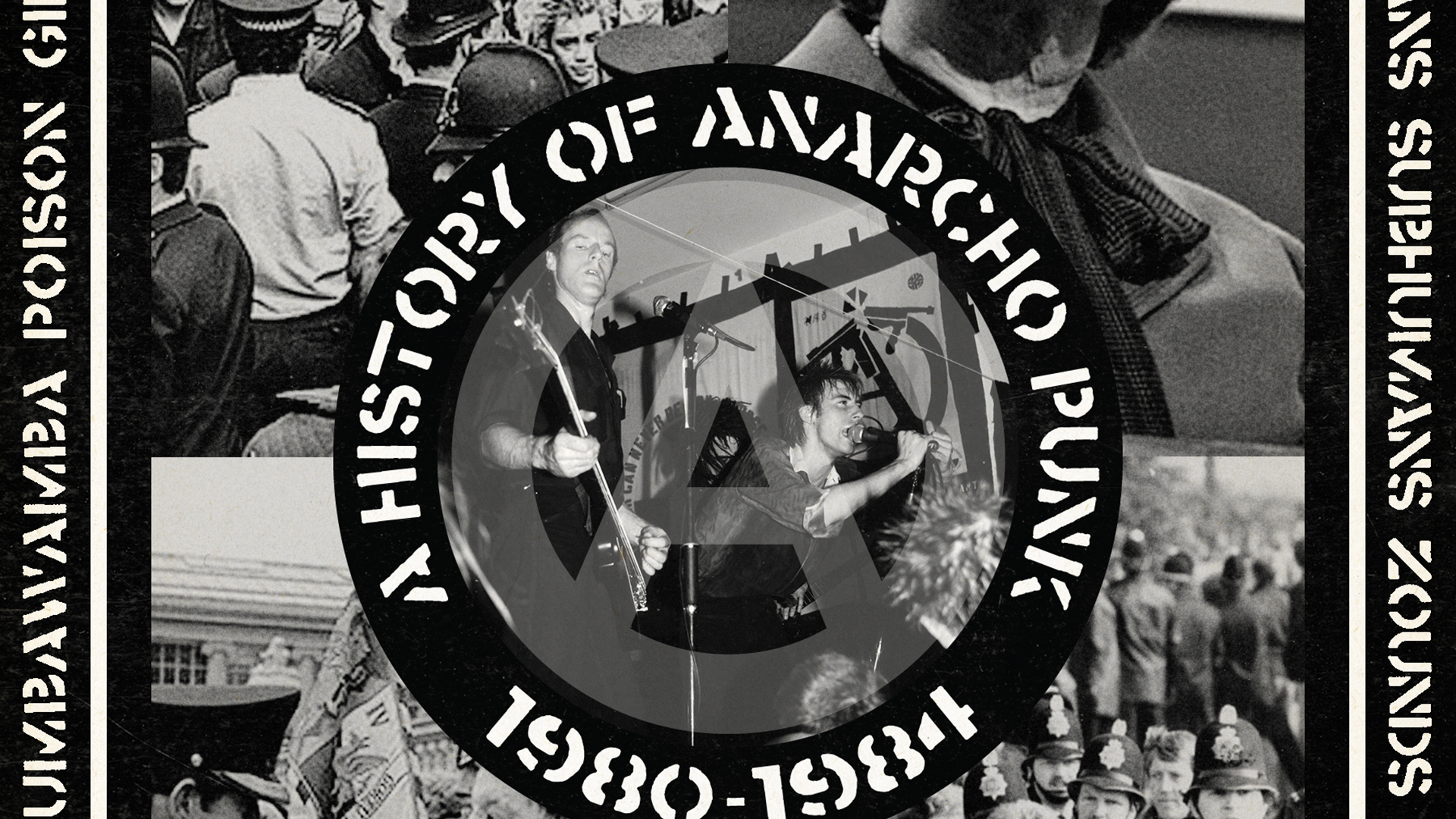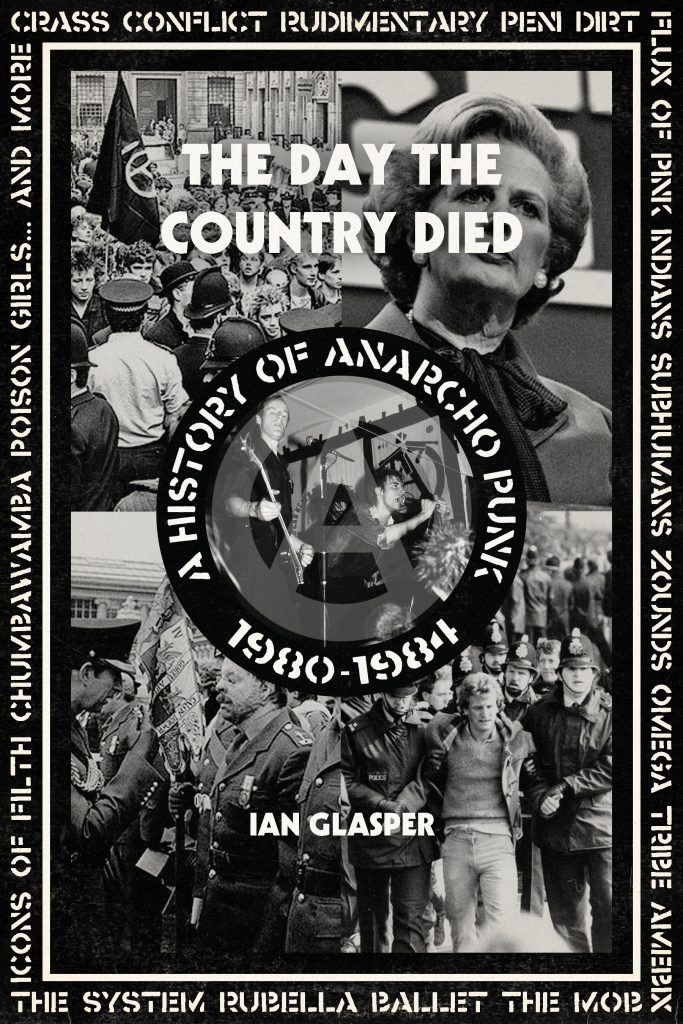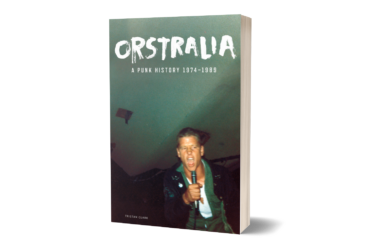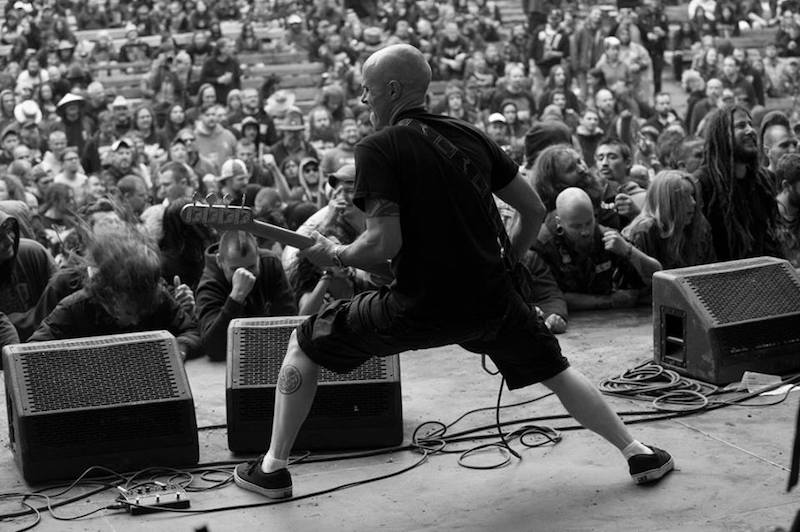
Sanctus Propaganda
September 3rd, 2017
Ian Glasper played in a dozen bands, played probably a thousand+ gigs, recorded a van of LPs, CDs and EPs and wrote four books on punk and hardcore in UK. That kind of books when you read them you think that this is exactly what the punk world was missing – properly researched and put together documentation of noise, propaganda and DIY ethics. He got into punk in the beginning of the 80s, when everything was being formed. When AMEBIX, SUBHUMANS, NAPALM DEATH and ENT all started properly. And he has been here ever since. What a better man to interview about punk in UK? Mind you, it’s a lengthy one. But you don’t mind, do you?
He has 4998 friends on Facebook. Although I looked a few days before and it was 5000, so 2 people lost their minds.
Note: the interview also appeared in a Polish fanzine called CHAOS W MOJEJ GŁOWIE. Here, is the English version.
Bring it on, Slug.
SP: Looking at your long and impressive band history, the punkiest you’ve been was FLUX and now WARWOUND. Apart from that you were a metal/hardcore kid, ha ha. I know you a little and I know you are a punk rocker so how come did you mostly end upon in serious hardcore acts hanging out with the likes of CRO-MAGS and MADBALL?
Ian Glasper: To be honest, for me the most ‘punk’ band I was in was DECADENCE WITHIN, because we always did exactly what we felt like – there were no rules in that band, we just followed our hearts, and that’s why every record sounded different… and probably why nobody liked us, ha ha!
And I’ve always looked upon the whole range of music I love as just that: music I love! Whether it’s punk, hardcore, thrash metal, psychobilly… even ‘80s pop music and ‘60s British Beat, or whatever… it’s just music that speaks to me, and I connect with.
It was the energy and intensity and defiance of punk that drew me into that, and that energy and intensity and defiance was there in hardcore too, which pulled me towards that… and the same for thrash metal too.
We never really “hung out” with the likes of MADBALL or CRO-MAGS, but we did do a lot of gigs with those bands, and AGNOSTIC FRONT and HATEBREED and CAUSE FOR ALARM … they all have their roots in punk, too.
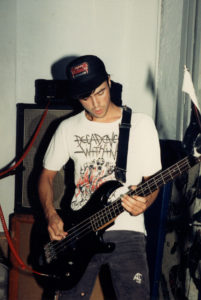
SP: Sometimes that looks like functioning in different scenes, don’t you think? The metal hardcore scene has got priorities somewhere else that punk and so on. You somehow managed to bridge that two scenes into one yourself.
Ian Glasper: You’re right, of course, the metal scene wasn’t as politically motivated as the punk scene, but crossover changed all that, to an extent anyway, as bands like COC, DRI, SACRED REICH, and even NUCLEAR ASSAULT etc., started to write much more aware lyrics. And although the metal scene was never as DIY as the punk scene, there was still a lot of underground tape-trading and stuff, so there was always some common ground.
I used to laugh at the satanic lyrics, but then again, I loved horror films, so they didn’t turn me off that much. And you also had bands like GBH singing about werewolves, and Broken Bones singing songs about people getting decapitated, and the DESTRUCTORS singing all those songs about serial killers… again, there was some common ground.
If I wanted to feel politically motivated, I’d listen to CRASS and CONFLICT, and if I wanted to thrash like a maniac and disengage my brain, I could listen to SLAYER and DARK ANGEL… and if I wanted something in-between there was LUDICHRIST and AGNOSTIC FRONT… there was so much good music out there, I never wanted to limit myself.
SP: Which of all those bands was really YOUR band. I assume it was DECADENCE WITHIN?
Ian Glasper: Yeah, that was my first serious band, and I wrote almost all the lyrics and music in that band, so it will always have a special place in my memories. I really grew as both a bassist and as a person in that band, and the people I was in the band with either were family (Mobs was my cousin), or grew to be family.
Although I also formed STAMPIN’ GROUND – with Mobs again – and wrote all the lyrics for that band, and we built that band up from nothing to being an international force in the hardcore scene, so it was something very personal for me. Unfortunately that band got too big, and I eventually felt too far removed from my punk roots when they inked a management deal etc., so I left at what I felt was the band’s natural peak. I couldn’t see how they could take it any further without compromising our original vision of what the band was always meant to be… and sure enough, although they did another 18 months touring, they never wrote another song after I left.
SP: And DECADENCE WITHIN was one of my favourite UK hardcore punk bands. You did get a label of a straight edge band, at least in Poland and I have nothing to do with it. Something that was not typical of a UK band especially late 80s…
Ian Glasper: Personally I stopped drinking and doing drugs when I was about 20/21, so around 1987/1988, but it wasn’t because I was “SXE”, it was because I was a really crap drinker, and always acting like an arsehole when I was pissed up, so I just decided to stop. I’ve never drawn an “X” on my hand or anything like that, and I’ve never called myself “straightedge”, this is just something I am, and the way I’ve chosen to live my life.
At the end of the ‘80s, all of DECADENCE WITHIN were on the same page as me as well, so yes, some people were labelling us “SXE”. It wasn’t good for us though, because we didn’t look or sound like a SXE band, so people were coming to gigs with preconceptions, and weren’t enjoying us. But it was always like that for us – we never really fit in properly anywhere, haha! We were always too metal for the punks, too punk for the metallers… I remember a crusty punk coming up to us at a gig and having a go at us for having clean clothes – he said we looked like bank clerks, not a punk band! And there was me thinking it was all about the music, not the fashion…!
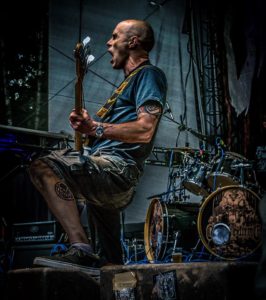
SP: How did you end up in WARWOUND? Is it another UK punk legends come back to a DIY scene?
Ian Glasper: Basically Damian contacted me, and told me he was putting WARWOUND back together, and that Rat was singing… I was interested, of course, but then he told me that the band would be playing some of the tunes he wrote in SACRILEGE and THE VARUKERS as well, and I was instantly in, because they were two of my favourite bands from the early ‘80s, and to play those songs with Rat and Damian is a proper fan-boy dream come true!
I think the main reason Damian re-started WARWOUND was because PROFANE EXISTENCE wanted to finally put out the 1983 demos as an LP, so he dug out the old recordings and started listening to them, and digging that thrashy style again. He had also reformed SACRILEGE to record a new song for the 30th anniversary of ‘Behind The Realms Of Madness’, so he had the bug for playing back again – but Tam from SACRILEGE won’t play any live shows, and Damian really wants to play those songs for people who didn’t hear them first time around… so WARWOUND is an outlet for that as well.
SP: Let’s stop for a while at this punk come backs thing. THE MOB. ICONS. ANTI SYSTEM. ANTISECT. DISCHARGE. WARWOUND. New E.N.T record sounds as if it should be record number zero in their discography. What do you reckon is the main reason for that? A history cycle for punk rock, crisis for new punk bands, a trend? And what is your opinion on all that?
Ian Glasper: I think if a band has some good music left in them, they should get and record it and put it out there. The thing is with punk, it keeps you young – we might be nearly 50, but we still feel 18, we still feel angry, and we’ve still got something to say. If it’s in your blood, it’s hard to let it go. As long as there are new, young bands coming through all the time as well, it’s a healthy thing, and helps the baton be passed down from one generation to the next.
SP: Does that mean we can expect a DECADENCE WITHIN come back? Never say never…
Ian Glasper: No, I don’t think that will ever happen, haha! We may get together to do some recordings though, because we’ve been talking about recording properly some songs we only ever recorded live at rehearsal, as it would be fun to do them in a studio. And we’re all still alive, and we’re all still friends, so why not? But we’ll never “reform”… we weren’t popular back then, so we’ll be even less so now…!
SP: You played bass for many heavy hardcore metal bands. But then some lighter stuff came along as well. Why were there so many of them? This hardcore metal stuff was no coincidence, was it?
Ian Glasper: I have many strings to my bow, my friend! I listen to crusty punk, thrash metal, heavy hardcore, melodic stuff… it’s nice not to have too many restrictions placed upon you, especially not by yourself, and it helps keep everything fresh. After STAMPIN’ GROUND, it was great to do some old school thrash metal with SUICIDE WATCH, and after that I went back to old school hardcore with FREEBASE for a while, but that made the really melodic hardcore stuff I then did with THIRTY SIX STRATEGIES even sweeter. And it challenged me as a musician as well, trying to find the right space in that band’s sound, and the right melodies to sit with the guitars and vocal hooks.
And from that, it was great to go right back to my roots and play some gnarly UK82 D-beat in WARWOUND. I get bored quite easily, and like to keep busy, and like to mix it up as well.
SP: You have written 4 books documenting UK hardcore punk bands, zines and labels. It’s a lot of years of hard work, a lot of research, digging people’s garages and basements. How did you work on that, what was your research style? You must have been a pain for some people.
Ian Glasper: It all started when I was writing for Record Collector, and reviewing punk books for them, and I kept getting sent books on THE CLASH and SEX PISTOLS… but never anything on DISCHARGE, EXPLOITED or GBH! And I was thinking, ‘Hang on a minute, everyone seems to think punk ground to a halt in 1980 – when for me, that was when it started!’ So I just decided to write the book on ‘80s punk that I wanted to see on my own book shelf, and it grew from there into a trilogy – plus one, haha!
When I started “Burning Britain”, there was no Facebook, so it was still old school investigative journalism, making lots of phone calls, writing lots of letters, just trying to track down all these old punks who had vanished off the face of the earth. Yes, I was a pain in the arse to some people, but thankfully they helped me find everybody (well, mostly everybody) and it all came together slowly.
Each book took between 2 and 3 years to write.
SP: What is to be done next after the 4 books. Anything that needs to be researched, documented, updated?
Ian Glasper: Well, I did update the first two for the US versions on PM Press, so you got seven new sections and an expanded discography in Burning Britain, and an expanded discography and extra photos for “The Day The Country Died…” you could keep updating and revising them over and over again, but it’s important to know when to say, ‘Enough’s enough!’
As for what is next, I’m about to start writing the history of UK thrash metal.
SP: Researching for so long must have given you the opportunity to get to know bands you hadn’t had the chance to hear back then. Can you name a few that you think deserve attention and were just great bands in the past with no major recognition in the scene?
Ian Glasper: Oh yeah, some of my favourite bands had very little recognition, like the LEGION OF PARASITES, REALITY CONTROL and TOTAL CHAOS (from Newcastle – not LA!), and some of my favourite bands only released one or two singles, like THE SAMPLES, THE UNDERDOGS and ULTRA-VIOLENCE. Those were the kind of bands I desperately wanted to get documented in the books, because if no one had written about them, they would eventually have been forgotten, or overlooked in favour of the bigger bands like CHAOS UK and DISORDER, and no one would have heard the incredible music that they created.
SP: One of your books was about British hardcore. Was UKHC influenced rather by NY or Boston HC? Or else? And what US bands were the most influential?
Ian Glasper: The UKHC scene took its influences from all sorts of places – there was definitely some NYC and Boston influences, but also a huge influence from Europe, especially Italy and Sweden/Finland. Also Japan! UKHC was a mash-up of what had come before in the UK – DISCHARGE and CRASS and ANTISECT etc. – with anything that was intense from the international punk scene. If it could be traded on a tape, it was reaching our shores and was open to influence – and plagiarism, haha! I think the most influential US bands on the early hardcore scene here were – after the DEAD KENNEDYS, of course – DRI, SEPTIC DEATH and SIEGE, and then you saw the likes of AGNOSTIC FRONT, BAD BRAINS and CRO-MAGS staring to exert an influence as the scene ‘progressed’…
SP: How do you feel about the New Wave of British Hardcore? With the likes of VIOLENT REACTION, ARMS RACE, etc Do you dig that?
Ian Glasper: I have slipped out of touch with it a little bit, as I don’t get to quite as many gigs as I used to, but I love what I hear, and VIOLENT REACTION are amazing. I dig anything alternative that’s born out of frustration and a need to vent your emotions in a positive way, so even if something doesn’t blow my mind musically, I can appreciate the sentiment and the motivation, and as long as it’s sincere and intense, I’ll be into it.
SP: How many books have been sold so far? Have they been translated into other languages? Were you happy with the reviews. Were there any results of that? I dunno, a phone call from BBC, ha ha.
Ian Glasper: I have no actual idea is the honest answer, I should have paid more attention to the statements Cherry Red sent, haha! But “Burning Britain” and “The Day The Country Died” have sold over 10,000 copies, and have been translated into Czech, Italian, French and German…
“Trapped In A Scene” has sold about 5000, and Armed With Anger about the same, or slightly less… they’ve also been released as Kindle e-books, and I have no idea how many people have downloaded them or anything. I’m just glad that people are reading them, and that they have been well received. I have been quoted in places like The Guardian and The Times, and often get listed in the top ten of ‘essential punk books’ and stuff like that, but that’s not really as important as the connection you make directly with the reader.
SP: How did TERRORIZER contribution come about? It’s not a punk zine and it’s not really DIY. What’s your contribution to it about?
Ian Glasper: Wow, that started back in 1993! I’ve been writing for them ever since issue # 3 and we’re up to issue 275 or something now! Back then I was buying a lot of hardcore and crossover CDs off a guy called Rob Clymo, who did a distro called Round Diamond (I think), and we would often talk on the phone, and he’d be amazed that I was asking for all these obscure records from overseas that he hadn’t heard of etc. Anyway, Rob started up TERRORIZER magazine, and asked me to do a hardcore column for him, which we called “Hardcore Holocaust”, and it grew from there.
Rob left the magazine years ago, and along came Nick Terry, who eventually left as well, and there have been many owners and editors since, but I’ve always hung in there, and have contributed to every issue since I started. It’s great for me, because it means I get lots of free music, of course, but also I have a platform to get new bands heard, and to get my friends’ bands some publicity etc.
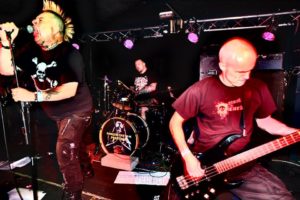
SP: You are now contributing for DOWN FOR LIFE Magazine. Tell us about it. Looks like a fresh big thing and another mainstream paper. What is your role there and what plans have you got with that?
Ian Glasper: The guys that are doing it were previously doing the BIG CHEESE magazine here in the UK, and they’re all good people, who love hardcore and punk, and I’ve known them a long time. Although it looks like a mainstream magazine, it’s more like a fanzine in many ways, because everyone involved is very much a fan, and the goal is to get good music onto the shelves of High Street shops. I’m just contributing a feature each issue, and doing some reviews for them.
SP: Do you think there is market for magazines like that in UK?
Ian Glasper: I hope so! The first issue was really well received – I hope it makes an impression and lasts as long as Terrorizer has!
SP: What was your main reason for setting up BLACKFISH record label? I can see the mix of promoting new era hardcore bands and bringing old good stuff back so the younger ones have the opportunity to check it out and the not so young one to complete their record collections. We both share the great love and passion for THE INSTIGATORS…
Ian Glasper: Again, it was just me fulfilling one of my goals in life. I’d always wanted to do my own label, and help some bands get started and get heard. I was in STAMPIN’ GROUND at the time, and we were doing a lot of gigs, and pulling decent crowds, and we were playing with a lot of great bands who didn’t have stuff out, so I figured I could release stuff by those bands, and then take them out on tour with SG, and get them in front of our audience and stuff. It worked really well, and I also tried to bring some of the DIY ethos to my releases, and tried to let the younger hardcore audience know about some classic old school bands like CONFLICT and SUBHUMANS too. It was a labour of love, and I didn’t make any money off it, but I’m very proud of every release I did – and I’m especially proud of releasing the debut Knuckledust album, as they have gone on to make a huge impact around the world, representing UKHC to this day.
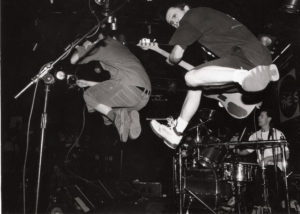
SP: Why did you stop releasing CDs? Was it finance, lack of time, not your thing? You’ve always been super busy, involved in so many projects…
Ian Glasper: Yeah, it was a lack of time really, as my wife and had just had our first child, but also I left STAMPIN’ GROUND, so there wasn’t that outlet to sell CDs on the road and take new bands out on tour. Also, the last few releases I did, I spent too much money on cover art and packaging and advertising, so they never broke even, and I didn’t want the label to turn into a money pit! I “quit” after exactly 20 releases, and the label just about broke even overall – I didn’t make any money, but I didn’t lose any either.
SP: Don’t you think that on this wave of UK punk comebacks BLACKFISH could very well find its own place brining back good old records into distros and stores?
Ian Glasper: It could, for sure, but I don’t have the time or inclination to resurrect it. Been there, done that etc. Life’s too short to go backwards TOO much, haha! Besides, there are plenty of younger, more relevant labels out there, doing it better than I ever could, so I’d rather just leave it to them.
SP: 80s, 90s, first decade of the new millennium and half way through the second one. Let’s face it, you’re not a young geezer – 4 decades of punk. As someone who had been actively involved through all these years , which decade is your favourite for punk in general? But please don’t get too sentimental…
Ian Glasper: Easy – the ‘80s. It was when I got into it, so it will always have a special place in my heart, but when I listen to that music, from all over the world, not just the UK, it still sounds amazing and timeless.
SP: OK, let’s start with the 80’s then. How would you characterise this decade for punk? For me it was the eruption of political punk. The formation of everything to come: music styles formed, names got established, approaches to life shaped thanks to that, record labels started, etc.
Ian Glasper: It was when punk came together for me, when all the best bits from the ‘70s were boiled down and taken to a new extreme. DISCHARGE were ground zero; they chewed up music and reinvented it, and there was no way you could ignore that urgency and intensity. I heard ‘Decontrol’ and I was hooked for life!
Plus the kids took the scene back from the businessmen in the ‘80s, and CRASS proved to everyone that you could do it yourself, you didn’t need permission off anyone else.
SP: It was the time when punk became vegetarian, wasn’t it? ALF came, hunt sabbing, etc. Did all these emerge from punk or punk stuck with it because it was up its street? What was your personal role in that?
Ian Glasper: I went vegetarian when I heard the ‘Neu Smell’ EP by FLUX… or it might have been ‘Meat Means Murder’ by CONFLICT… either way, I was 13 or 14 years old and punk music was making me think about my lifestyle, and it had a huge positive impact on my thought processes that has stayed with me ever since. I don’t think any other music has been so socially and politically aware for such a sustained period of time. My personal role was that I changed my lifestyle, and I tried my best to spread that message through my own music and writing. I used to go hunt-sabbing and on marches and stuff, and even partook in some direct action, which didn’t really achieve very much apart from land me in trouble with the law, so I soon bowed out of that. Again, there are people that are actually good at that stuff, so it’s best left to the experts; I was just an amateur, doing what I thought was right at the time, but probably having a detrimental effect on the cause in the long-run.
SP: It was also the time for riots. Thatcher, poll tax, strikes. The country was shaking. The people were pissed off. How much was punk really involved in that? Was it only by being critical, shouting out punk lyrics, doing benefit gigs, or was the movement more serious about the political situation in the country?
Ian Glasper: There were some serious protests spearheaded by punk that made their mark, like the Stop The City demonstrations, and there were other forms of protest like hunt-sabbing and CND rallies etc. that were already underway, but welcomed all these new recruits from the punk scene with open arms. For years, I genuinely believed that punk could change the world, that we could actually overthrow the system, but eventually realised at the end of the day, punk is just music, and the only revolution it can really achieve successfully is a revolution of thought, in the listener’s own mind – it plants a seed, and what you do with it is up to you. That’s better than nothing though.
SP: How did you, as a young punk rocker, find yourself in that times? With your family life, etc?
Ian Glasper: My family life was fine. We weren’t especially poor, and we weren’t especially well off. My mum and dad were always supportive of me and my music, and actually went vegetarian a few years after I did – and are still vegetarian to this day. I thank them for letting me find my own way in life.
SP: The 90s were the turning point for me in punk in UK. We lost many great bands for good (RIPCORD, HERESY, ELECTRO HIPPIES just to name a few). On the other hand new people came, there was a strong growth of DIY movement, punk labels, squats, tours, the organisation got much better. How do you look at this period?
Ian Glasper: The early ‘90s were a bit of a struggle, for sure, but the bands and people that meant it kept playing. DECADENCE WITHIN wound down in 1994, but we were already starting up BURNSIDE straight away, and then me and Mobs had already started up STAMPIN’ GROUND as Burnside was winding down – so we never stopped playing, and things really started happening in the late ‘90s for STAMPIN’ GROUND, and we were actually playing more gigs than ever before, and travelling all over to do them. So I guess the ‘90s were a decade of transition. If you hung in there, you came out the other end intact!
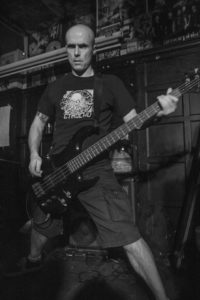
SP: During that times there was also a significant growth of anti fascist movements in UK with the rise of BNP, etc. Were you, the bands you played in a part of the movement?
Ian Glasper: I don’t align myself with political movements full-stop, but any decent, forward-thinking person is anti-fascist, right? And we made our opinion known through the songs we wrote and the interviews we gave, and occasionally we encountered violence at gigs from the right… and also from the left, truth be told. That’s why I never align myself with a particular ‘camp’, because no ideology is black and white, and my opinions aren’t copied from a specific doctrine, they’ve been learnt over the years of my life from a million experiences and conversations. It seems crazy to then be asked to define yourself as simply ‘left’ or ‘right’ wing. I guess I’m basically a libertarian if you have to throw a label on me…?
SP: How would you really characterise the new millennium punk scene? We mentioned the come backs. The bands, the labels, they always come and go. What is the true spirit of todays punk in UK? What is it for these days?
Ian Glasper: First and foremost, punk is FUN, it’s about good music and good friends. Let’s not kid ourselves here! But then it’s also about social awareness, and promoting a sustainable future for humanity and the planet, and being a voice for those who have no voice, and making a positive change in ourselves and those we interact with.
SP: You are a punk dad. Are your kids into punk and hardcore music wise? And then, thinking wise? What have you passed down to them and what has found home in their minds?
Ian Glasper: They don’t like the music much, but they know there’s no god and that the government lies to them, and they know to treat other people with decency and respect regardless of their skin colour or sexual orientation or whatever. So they may deny it, but they actually are pretty punk rock really!
SP: In 2017 is punk not dead?
Ian Glasper: If I may quote FLUX, “Punk will never be dead, as long as some of us refuse to be led…” Actually I’ll also quote BIOHAZARD: “Music is for you and me, not the fucking industry…”
No, punk’s not dead… in fact, as far as I can see, it’s never been healthier.
Ian Glasper (Slug)
Born 1967
1982 – 1983 Little Things Please Little Minds fanzine, editor
1983 – 1984 Ammonia 77, bass guitar
1984 – 1994 Decadence Within, bass guitar
1993 – present Terrorizer magazine, contributor
1994 – 1995 Burnside, bass guitar
1995 – 2003 Stampin’ Ground, bass guitar
1998 – 2003 Blackfish Records, owner
1998 – 1999 Human Error, bass guitar
2000 – 2003 Record Collector magazine, contributor
2004 – Burning Britain – The History of UK Punk 1980-1984, author
2004 – 2008 Suicide Watch, bass guitar
2007 – The Day the Country Died: A History of Anarcho Punk 1980-1984, author
2007 – 2008 Flux of Pink Indians, bass guitar
2008 – 2009 Betrayed By Many, bass guitar
2009 – Trapped in a Scene UK hardcore 1985-1989, author
2010 – present Mass Movement online fanzine, contributor
2012 – Armed With Anger – How UK Punk Survived the 90s, author
2012 – 2014 Freebase, bass guitar
2012 – 2015 Thirty Six Strategies, bass guitar
2015 – present Warwound, bass guitar
2012 – present Bass Guitar Magazine, contributor
2016 – present Down For Life magazine, contributor
2018… Let There Be Death: The History Of UK Thrash Metal, author
Married.
Father of two.
Other passions: reading, watching horror/sci-fi/fantasy films, swimming & keeping fit, travelling, Scrabble!

